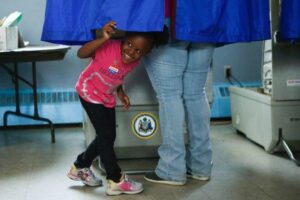November 06, 2018
You Need To Teach Your Kids About Voting
We’re not here today to preach about party or beliefs. Those things have nothing to do with exercising one’s right to vote. The fact remains that people throughout American history have fought long and hard battles to achieve their right to vote, and America’s youth should understand that privilege, and the ramifications of not exercising it, long before they turn 18.
Some stark facts:
Congress gave African American men the right to vote in 1869. Prior to that (1776), only white men age 21 and older who owned land could vote.
Women were not allowed to vote nationwide until 1920. in 1924 Native Americans were granted citizenship and the right to vote. In 1964 the federal Civil Rights Act was passed, which ensured that all men and women, age 21 and older, had the right to vote regardless of race, religion, or education. In 1971 the voting age was lowered to 18, and it wasn’t until 1984 that polling places were legally required to be accessible to people with disabilities. (Information provided by the Washington Secretary of State).
Voting has not rarely been an equal right, and there are still so many struggles today. Not to mention heaps of damaging rhetoric about how one’s vote doesn’t count, or why your vote doesn’t matter as much if you live in a state that aligns with your personal party affiliation.
Voting isn’t just about presidential elections, or even midterms. It’s about being invested in your community and whether or not your community is representing the values and beliefs most important to you. Making your voice heard on a very local level is just as important as casting your vote for the next President of the United States.
The best way to teach your children about voting is to make it a family friendly activity. Go through your state’s ballot with your child during each election, both the candidates and the propositions. Explain what’s on the ballot and why it matters. Do the research together, and let them determine which issues are important to them. Take them to the polls, watch election day coverage, pass along pertinent news and articles. Invest in your right to vote, so they see it loud and proud, and understand how and why it matters.
There are so many barriers to voting in this country, and getting the information you deserve is one of the greatest steps towards exercising your right. Help your child learn how to speak their truth, and express themselves. Teach them how to be a responsible voter.
Want more information? Here are two excellent pieces to help you encourage your child to exercise their right to vote:
Bring your kids to polls, and six other ways parents can help democracy by changing America’s culture of not voting.
A parent’s guide to talking about the Presidential election.
*Image from the New York Times
